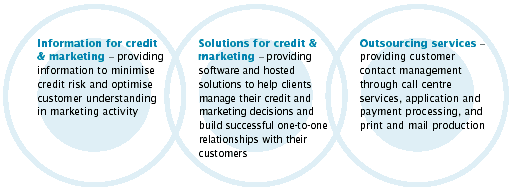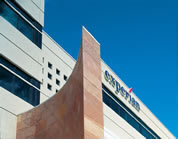|
|
Experian North America
proved itself to be a highly resilient business in difficult market conditions.
Experian International had another very successful year.
Experian
Experian continued to strengthen its position in the
global market for information solutions through its three key strategic
objectives:
- Building on its core information business, particularly through expansion
into new industry sectors and new international markets.
- Developing and selling new solutions through constant product innovation.
- Acquiring other businesses, either to strengthen Experianís global
product offering or to seize new market opportunities.
Profits for Experian as a whole were £229m, 6% ahead of
last year. Major contracts were won during the year in both Experian North
America and International, with a total contract value of over £140m.
The increasing breadth of Experianís product range continued to create
opportunities for cross-selling, with over 70% of clients taking services
from more than one of its three business areas Ė information, solutions
and outsourcing.
Fraud prevention was a key growth area as Experian helped fight the growing
problem of identity fraud. Its databases are increasingly being used to
establish the identity of customers before a transaction takes place,
reflecting the rapid growth in transactions over the telephone and Internet.
There was growing demand, too, for Ďcustomer data integrationí, a solution
known as Truvue that links disparate records to provide a complete picture
of each customer. This service is vital to successful customer relationship
management and Experian won contracts in industries as diverse as telecoms,
financial services, automotive and retail.
Experian also launched a major new growth initiative for selling direct
to consumers. Consumers in North America can now access their Experian
credit report and credit rating over the Internet for an annual fee.

Experian North America
Experian North America was operating in particularly
challenging market conditions as a result of the economic slowdown and
the aftermath of the September terrorist attacks. Despite this, sales
increased by 4% and profits, after restructuring charges, by 3%.
Sales of Credit Information and Credit Solutions
were helped by lower interest rates, which stimulated the mortgage and
automotive markets. But sales of new products were also growing, particularly
in areas such as fraud prevention, vehicle history information and the
sale of credit reports direct to consumers.
Marketing Information and Marketing Solutions were directly affected by
the weakness of the US economy, with sales slightly down as some clients
reduced their marketing expenditure. Sales of Outsourcing services, mostly
concerned with direct mail production, were similarly affected by the
downturn in direct marketing.
FARES, the real estate joint venture, had an exceptional year, benefiting
particularly from a buoyant mortgage refinancing market. Experianís 20%
share of FARES profits totalled over £30m for the year.
A key objective for the year was to continue improving cost efficiency.
This required some restructuring of the business, which resulted in the
number of employees being reduced by 700, representing 12% of the workforce.
At the same time, there was continuing investment in new growth initiatives
and a further strengthening of the management team, including the appointment
of Don Robert as Chief Operating Officer, previously President of First
American Consumer Information.
The new Truvue product for integrating customer information was bought
by 24 clients, including GE Capital. Dell Financial Services began using
Experianís authentication service to verify the identity of customers
buying Dell Computers online. Toyota became the first company to use Experianís
new National Fraud Database, North Americaís only national source of verified
fraudulent credit activity.
Since the year-end, Experian has acquired ConsumerInfo.com, the leading
supplier of online credit reports to US consumers, for $130m. This substantially
strengthens Experianís existing direct-to-consumer services, which represent
an important area of future growth.
Experian International
Experian International, which accounts for over one third of worldwide
sales, had another successful year. Sales increased by 13% and profits
by 14%.
There was strong growth in Credit Solutions, as organisations became more
concerned about fraud and credit risk and turned to Experian for solutions.
In the UK, Camelot chose Experianís e-identity product as an authentication
tool for its online lottery to ensure that customers are who they say
they are, while HBOS took Experianís anti-money laundering system for
its business banking division.
A number of other major wins contributed to this growth. Experian became
the preferred supplier of consumer credit information to a consortium
of Spanish banks. It was also successful in selling credit risk and customer
management solutions to new markets such as Brazil, Columbia and Korea.
Marketing Information and Marketing Solutions sales growth slowed during
the year, but by less than direct marketing industry trends. There were
significant business wins, including a permission based e-mail marketing
solution for the BBCís online news service. Other contracts included prospect
targeting and customer management solutions for The Telegraph newspaper
and sales response systems for Volvo and Lexus.
Outsourcing also demonstrated good growth, particularly in Europe where
Experian was awarded a five-year contract to provide cheque processing
services to BNP Paribas in France.
Key objectives for Experian International continued to be the development
of new value-added products and the broadening of its capabilities through
targeted acquisitions. During the year, Experian acquired Cards Direkt,
a German loyalty card company, in order to extend its account processing
capabilities in Europe. Since the year-end, Experian has acquired the
remaining 51% of MCL, a fraud management business. Major new products
included the Motor Insurance Database, which is already used extensively
by UK insurers and the police.
|

